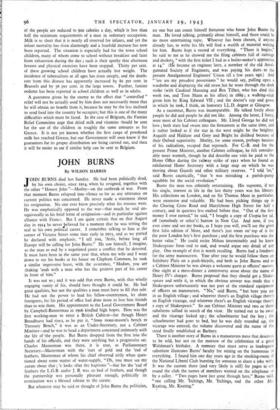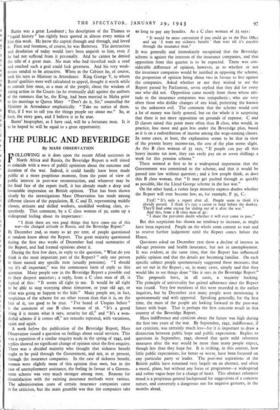JOHN BURNS
By WILSON HARRIS
JOHN BURNS died last Sunday. He had been politically dead, by his own choice, since 1914, when he resigned, together with the other " Honest John "—Morley—on the outbreak of war. From that moment Burns relapsed into silence so far as any utterance on current politics was concerned. He never made a statement about his resignation. No one ever knew precisely what his reasons were. He was emphatically opposed to the war—that much he said un- equivocally in his brief letter of resignation—and in particular against alliance with France. But I am quite certain that on that August day in 1914 he neverielieved for a moment that he was setting the seal to his own political career. I remember talking to him at the corner of Victpria Street some time early in 1915, and as we parted he declared with emphasis, " I tell you, 'Arris, before long all Europe will be calling for John Burns." He saw himself, I imagine, as the man to end by a negotiated peace a conflict that he detested. It must have been in the same year that, when my wife and I went down to see his books at his house on Clapham Common, he took a similar impressive leave, with the assurance, " Madam, you are shaking 'ands with a man who has the greatest part of his career in front of him."
It was not so ; and it was odd that even Burns, with that wholly engaging vanity of his, should have thought it could be. He had great qualities, but not the qualities a man must have to fill that role. He had not the power to lead his fellow-countrymen, let alone foreigners, for his period of office had done more to lose him friends than to win them. His appointment to the Local Government Board by Campbell-Bannerman in 1906 kindled high hopes. Here was the first working-man to enter a British Cabinet—for though Henry Broadhurst had risen, as he put it, " from stone-mason's bench to Treasury Bench," it was as an Under-Secretary, not a Cabinet Minister—and he was to head a department concerned intimately with the life of 'the people. But Burns dropped from the first into the hands of his officials, and they were anything but a progressive set. Charles Masterman was there, it is true, as Parliamentary Secretary—Masterman with the 'earl of gold and the 'cad of feathers, Masterman of whom his chief observed airily when ques- tioned about some matter of water-supply, " Oh, you must see my curate about that ; 'e looks after the baptisms "—but for the 'ead of feathers the L.G.B. under J. B. was no bed of feathers, and though the partnership was personally pleasant enough, politically its termination was a blessed release to the curate.
But whatever may be said or thought of John Burns the politician,
no one but can count himself fortunate who knew John Bums the man. He loved talking, primarily about himself, and there could be
no more entertaining topic. Whoever has been chosen, if anyone already has, to write his life will find a wealth of material waiting for him. Burns kept a record of everything. " There it begins," he said to me as he showed me the filing cabinets full of cuttings
and dockets, " with the first ticket I had as a boiler-maker's apprentice at 14." (fie became an engineer later, a member of the old Amal- gamated Society of Engineers, and was paying his dues . to the present Amalgamated Engineers' Union till a few years ago.) And "'ere are my proudest possessions" he would say, pulling open a
wardrobe and displaying the old straw,hat he wore through the dock strike (with Cardinal Manning and Ben Tillett, who has died this week too, and Tom Mann as his allies) in 1889 ; a walking-stick given him by King Edward VII ; and the doctor's cap and gown in which he took, I think, an honorary LL.D. degree at Glasgow.
As a raconteur, Burns was incomparable. He talked freely about people he did and people he did not like. Among the latter, I fancy, were most of his Cabinet colleagues. Mr. Lloyd George he did not love ; both stars had swum into the firmament at the same time, and it rather looked as if the star in the west might be the brighter.
Asquith and Haldane and Grey and Bright he disliked because of their Oxford superiority. Morley, for some reason, perhaps because of his radicalism, escaped that reproach. For C.-B. and for the present Prime Minister, another Cabinet colleague, he felt consider-
ably more warmth, though he did describe one visit he paid to the Home Office during the railway strike of 1911 when he found an
exhilarated Home Secretary with a large map on which he was moving about Guards and other military reserves. " I told 'im," said Burns caustically, " that 'e was mistaking a parish-pump squabble for the social revolution."
Burns the man was infinitely entertaining. His supreme, if not his single, interest in life in the last thirty years was his library.
His collections on London, and on Sir Thomas More in particular,
were extensive and valuable. He had been picking things up in the Charing Cross Road and Marylebone High Street for half a century, and in quarters less exalted before that. " Out of the first money I ever earned," he said, " I bought a copy of Utopia for 2d. off (somebody or other's) barrow in New Cut. And now, if you
ever come and see my books, as I hope you will, you'll see the great
first folio edition of More, and there's just room on top of it for the poor London boy's first purchase ; and the first purchase was the better value." He could recite Milton interminably and he knew
Shakespeare from end to end, and would argue any detail of any play. One example of that is worth recalling. Burns had a fondness
for the army manoeuvres. Year after year he would follow them on Salisbury Plain on a push-bicycle, and both as John Burns and as a Cabinet Minister he was always a welcome guest at officers' messes.
One night at a mess-dinner a controversy arose about the name of
Henry IV's charger. Burns proposed' that they should get a Shake- speare and settle it, to which the obvious answer was made that a
Shakespeare unfortunately was not part of the standard equipment of officers on manoeuvres. "No," said Burns, " but here you are in an English village ; and wherever there's an English village there's an English vicarage, and wherever there's an English vicarage there's a copy of Shakespeare." So out Cabinet Minister and two or three subalterns sallied in search of the vicar. He turned out to be away
and the vicarage locked up ; the schoolmaster had the key ; the schoolmaster had gone to bed, but he was duly rounded up, the vicarage was entered, the volume discovered and the name of the steed finally established as Barbary.
There is another story of Burns in a manoeuvres mess that deserves to be told, but not on the morrow of the celebration of a great Welshman's birthday. A memory that must serve as inadequate
substitute illustrates Burns' faculty for seizing on the humorous in everything. I found him one day years ago in the smoking-room of
the National Liberal Club bursting for someone to share a joke with. It was the custom there (and very likely is still) for pages to cry round the club the names of members wanted on the telephone or by a caller. " Two pages have just gone through here," Burns said. " one calling Mr. 'Itchings, Mr. 'Itchings, and the other Mr. Keating, Mr. Keating."
Burns was a great Londoner ; his description of the Thames as "liquid history" has rightly been quoted in almost every notice of him this week. He knew the capital through and through, and loved it. First and foremost, of course, he was Battersea. The destruction and desolation of today would have been anguish to him, even if he had not suffered from it personally. And he cannot be denied the title of a great man. No man who had travelled such a road and reached such a goal could lack greatness. And his very weak- nesses tended to be attractive. When in the Cabinet he, of course, took his turn as Minister in Attendance. King George V, to whom Burns' qualities were well calculated to appeal, thought it worth while to consult him once, as a man of the people, about the wisdom of taking action in the Courts (as he eventually did) against the authors of the rumours that he, the King, had been married in Malta prior to his marriage to Queen Mary " Don't do it, Sir," counselled the Minister in Attendance emphatically. " Take no notice of them. Why, if I was to tell you the things people say about me." So, at least, the story goes, and I believe it to be true: Burns' biographer, as I have said, will be a fortunate man. It is to be hoped he will be equal to a great opportunity.



























 Previous page
Previous page